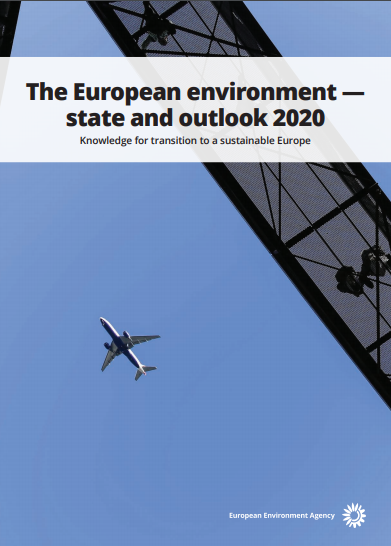New report warns over worsening state of Europe’s environment
- December 12, 2019
- Posted by: administrator
- Category: Environmental, Water Issues, Europe

A new report is warning that Europe will not achieve its 2030 goals without urgent action during the next 10 years to address the alarming rate of biodiversity loss, increasing impacts of climate change and the over-consumption of natural resources.
Europe faces environmental challenges of “unprecedented scale and urgency”, according to the European Environment Agency’s (EEA) latest State of the Environment 2020 report published his week.
While European environment and climate policies have helped to improve the environment over recent decades, Europe is not making enough progress and the outlook for the environment in the coming decade is not positive, the EEA says.
SOER 2020 is the most comprehensive environmental assessment ever undertaken on Europe, providing a stark snapshot of where Europe stands in meeting its 2020 and 2030 policy targets.
Launching the report, Hans Bruyninckx, EEA Executive Director commented:
“Europe’s environment is at a tipping point. We have a narrow window of opportunity in the next decade to scale up measures to protect nature, lessen the impacts of climate change and radically reduce our consumption of natural resources.”
“Our assessment shows that incremental changes have resulted in progress in some areas but not nearly enough to meet our long-term goals.”
According to the EEA, Europe has already made significant progress over the past two decades in terms of climate change mitigation, reducing greenhouse gas emissions. Signs of progress are also evident in other areas, such as tackling air and water pollution and the introduction of new policies to tackle plastic waste and bolster climate change adaptation and the circular and bio-economy.
Urgent call for scaling up and speeding up change
However, the report is urging European countries, leaders and policymakers to seize the opportunity and use the next decade to radically scale up and speed up actions to put Europe back on track to meeting its medium and longer-term environmental policy goals and targets to avoid irreversible change and damage.
While the current range of European policy actions provide an essential foundation for future progress the EEA says they are not enough – Europe needs to do things better, address certain challenges differently, and it needs to rethink its investments.
State of Europe’s environment has worsened and outlook is mixed
Overall environmental trends in Europe have not improved since the last EEA state of the environment report in 2015. The assessment notes that while most of the 2020 targets will not be achieved, especially those on biodiversity, there is still a chance to meet the longer-term goals and objectives for 2030 and 2050.
While Europe has made important gains in resource efficiency and the circular economy, recent trends highlight a slowing down of progress in areas such as reducing greenhouse gas emissions, industrial emissions, waste generation, improving energy efficiency and the share of renewable energy. Looking ahead, the current rate of progress will not be enough to meet 2030 and 2050 climate and energy targets, the report warns.
Seven key areas where “bold action” is needed
The report outlines seven key areas where bold action is needed to get Europe back on track to achieve its 2030 and 2050 goals and ambitions.
- Realise the unfulfilled potential of existing environmental policies. Fully implementing existing policies would take Europe a long way to achieving its environmental goals up to 2030.
- Embrace sustainability as the framework for policy making. Developing long-term policy frameworks with binding targets starting with the food system, chemicals and land use will stimulate and guide coherent actions across policy areas and society.
- Lead international action towards sustainability. The EU should use its diplomatic and economic influence to promote the adoption of ambitious international agreements in areas
- Foster innovation throughout society. Changing the current trajectory will closely depend on the emergence and spread of diverse forms of innovation that can trigger new ways of thinking and living.
- Scale up investments and reorient the finance sector to support sustainable projects and businesses.This requires investing in the future by making full use of public funds to support innovation and nature-based solutions, procuring sustainably and supporting impacted sectors and regions. It also entails engaging the financial sector in sustainable investment by implementing and building on the EU’s Sustainable Finance Action Plan.
- Manage risks and ensure a socially fair transition. A successful transition to sustainability will require that societies acknowledge potential risks, opportunities and tradeoffs, and devise ways to manage them.
- Build more knowledge and know-how. This entails additional focus on understanding the systems driving environmental pressures, pathways to sustainability, promising initiatives and barriers to change. Further capacity-building is needed to navigate a rapidly changing world by investing in education and skills.
Click here to access the European environment state and outlook 2020 (SOER 2020) report
